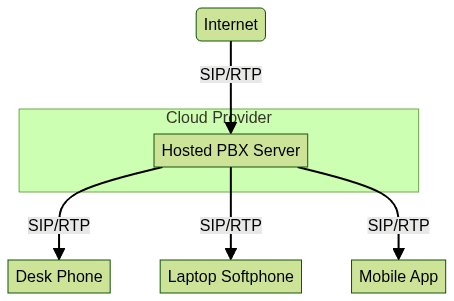Introduction to Hosted PBX Phone System
A hosted PBX phone system is revolutionizing business communications in 2025 by delivering enterprise-grade features through cloud infrastructure. Unlike traditional on-premise phone systems, a hosted PBX phone system operates via the internet, letting organizations streamline voice, messaging, and collaboration tools without heavy hardware investments. With the rise of hybrid and remote work, cloud-based communications have become critical for developer teams and IT-driven businesses seeking agility, cost efficiency, and robust feature sets. In this post, we’ll dive deep into what a hosted PBX phone system is, how it works, why it’s a strong fit for tech-centric organizations, and how to choose and implement the right solution.
What is a Hosted PBX Phone System?
A hosted PBX (Private Branch Exchange) phone system is a cloud-based service that manages business telephony over the internet. Instead of relying on physical PBX hardware located onsite, the service provider hosts and maintains all necessary infrastructure in secure data centers. Users connect to the hosted PBX phone system from any location using IP-enabled phones, softphones, or mobile apps. For businesses looking to enhance their telephony solutions, integrating a
phone call api
can further streamline voice communication and enable advanced calling features.How Hosted PBX Phone System Works
Technically, a hosted PBX phone system routes calls, manages extensions, and controls telephony features via cloud-based software. This architecture enables seamless connectivity across multiple devices and locations. Developers aiming to add real-time voice capabilities to their applications can leverage a
Voice SDK
for easy integration and enhanced flexibility.
Traditional PBX vs Hosted PBX
Hosted PBX phone systems outclass traditional PBX in several dimensions. Here’s a quick technical and business-oriented comparison:
1| Feature | Traditional PBX | Hosted PBX Phone System |
2|--------------------|-----------------------|------------------------------|
3| Hardware | On-premise | Cloud-hosted |
4| Upfront Cost | High | Low/None |
5| Maintenance | IT staff required | Provider-managed |
6| Scalability | Hardware-bound | Instantly scalable |
7| Reliability | Single-site | Geo-redundant cloud |
8| Remote Access | Limited | Seamless, global |
9| Feature Updates | Manual, slow | Automatic, frequent |
10Key Features of Hosted PBX Phone Systems
Core Features
A hosted PBX phone system typically includes:
- Voicemail: Centralized, accessible from any device
- Call Forwarding: Route calls based on rules or status
- Auto Attendant: Automated menus to direct callers efficiently
- Call Routing: Intelligent distribution for departments or remote teams
If your business requires more than just voice, consider integrating a
Video Calling API
to enable seamless video meetings alongside traditional telephony.Advanced Features
Modern hosted PBX phone systems support:
- Analytics: Real-time dashboards and historical reporting for call data
- Integrations: APIs and connectors for CRM, helpdesk, or custom apps
- Mobile Apps: Native iOS/Android clients for remote communication
- Call Recording: On-demand or always-on, with compliance controls
For teams looking to quickly add video or audio communication to their platforms, you can
embed video calling sdk
solutions for rapid deployment and minimal coding effort.Security & Compliance
Security is paramount for any hosted PBX phone system:
- Zero-Trust Architecture: Every user and device is authenticated per session
- Encryption: SIP over TLS, SRTP for media, encrypted storage for recordings
- Role-Based Access Control (RBAC): Granular permissions for admins, agents, and end users
For organizations prioritizing secure and scalable voice integration, a
Voice SDK
can provide robust authentication and encryption features out of the box.Example security configuration (RBAC in JSON):
1{
2 "roles": {
3 "admin": ["manage_users", "view_reports", "configure_routes"],
4 "agent": ["answer_calls", "view_call_logs"],
5 "user": ["make_calls", "access_voicemail"]
6 }
7}
8Benefits of Hosted PBX Phone System
Cost Savings
A hosted PBX phone system eliminates the need for expensive onsite hardware. Most providers offer pay-per-user or pay-as-you-grow pricing, reducing capital expenditure and shifting costs to predictable operational expenses. This model is ideal for startups, scale-ups, and enterprise IT teams aiming to optimize budgets. Businesses can further reduce costs by integrating a
phone call api
for scalable and affordable voice solutions.Scalability & Flexibility
Adding or removing lines is as simple as updating a web dashboard, with no downtime or hardware changes. Hosted PBX phone systems naturally support distributed, remote, or hybrid teams—critical for tech companies and developer operations in 2025. For those expanding into video communications, an
embed video calling sdk
allows businesses to add video conferencing capabilities with minimal setup.Reliability & Call Quality
Top-tier hosted PBX phone system providers leverage geo-redundant data centers, load balancing, and proactive monitoring to guarantee high uptime and consistent call quality. Leveraging a
Video Calling API
can further enhance the reliability and quality of both voice and video communications across global teams.Sample SLA excerpt:
1# Uptime SLA for Hosted PBX Phone System
2service_level_agreement:
3 uptime: 99.999%
4 monitoring: 24x7x365
5 response_time:
6 critical: 15m
7 major: 1h
8 minor: 4h
9How to Choose the Best Hosted PBX Phone System Provider
Factors to Consider
When selecting a hosted PBX phone system provider, weigh the following:
- Customer Support: 24/7 availability, tech-savvy staff
- Pricing Models: Transparent, flexible, no hidden fees
- Features: Core and advanced capabilities for your workflow
- Integrations: Support for key business and developer tools (APIs, webhooks)
If your workflow depends on custom integrations, a robust
phone call api
can ensure seamless connectivity with your existing business applications.Evaluating Customer Service
Reliable support is vital for business continuity. Look for providers with documented SLAs, real-time status dashboards, and positive user reviews from developer and tech communities.
Comparing Providers
Evaluate your options with a structured decision flow:

Implementation: Setting Up a Hosted PBX Phone System
Step-by-Step Guide
- Needs Assessment: Audit business requirements, call volume, integration needs
- Provider Selection: Compare providers using the framework above
- Setup & Configuration: Provision users, configure SIP trunks, set call routing
For developers, integrating a
phone call api
during setup can streamline the process of adding advanced calling features to your business communications.Sample SIP trunk configuration (YAML):
1sip_trunk:
2 provider: examplepbx.com
3 username: "dev_team"
4 password: "s3cur3p@ssw0rd"
5 endpoints:
6 - "sip:1001@examplepbx.com"
7 - "sip:1002@examplepbx.com"
8 codecs:
9 - "G711"
10 - "G729"
11 encryption:
12 signaling: "TLS"
13 media: "SRTP"
14Tips for Smooth Transition
- Port Numbers Early: Initiate number porting before cutover
- User Training: Provide guides and live sessions
- Testing: Validate all call flows, failover, and integrations before go-live
Hosted PBX Phone System Use Cases
Hosted PBX phone systems are integral to:
- Small Businesses: Affordable, feature-rich communication
- Remote/Hybrid Teams: Seamless connectivity for distributed devs
- Call Centers: Advanced routing, analytics, and real-time monitoring
For organizations supporting remote teams or customer support, integrating a
Voice SDK
can enhance live audio experiences, while aVideo Calling API
enables high-quality video interactions. Industry examples include SaaS startups, managed IT providers, and tech-enabled consultancies leveraging hosted PBX phone systems for developer support lines and customer success operations.Conclusion
A hosted PBX phone system empowers organizations with scalable, secure, and feature-rich communications, eliminating hardware headaches and enabling future-proof collaboration. For developer-driven teams, the flexibility, reliability, and integration capabilities of hosted PBX phone systems make them an essential part of the modern tech stack in 2025. Assess your needs, compare providers, and elevate your business communication today. Ready to modernize your communications?
Try it for free
and experience the benefits firsthand.Want to level-up your learning? Subscribe now
Subscribe to our newsletter for more tech based insights
FAQ